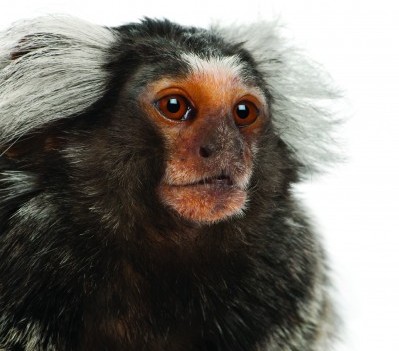
Parkinson’s UK, through ‘Virtual Biotech’, their drug development arm, will provide funding of more than £780,000 for work which will include testing a drug named NLX-112 on primates. The work will be in partnership with a drug company – Neurolixis – and with King’s College London, which has a colony of marmoset monkeys. Parkinson’s UK stated on their website that the work would include ‘safety and efficacy testing in a marmoset model of Parkinson’s’.
Although there are no details of exactly what the monkeys will suffer, the usual way in which Parkinson’s is ‘modelled’ in marmosets is by giving them a series of injections of a chemical called MPTP. This is known to cause severely debilitating, distressing effects and Parkinson-like symptoms, including paralysis and total loss (or extreme slowness) of movement, rigidity, loss of vocalisation, lack of muscle movement including eye rigidity, lack of coordination, uncontrollable body tremors and a hunched posture. We have previously reported how, at this stage, monkeys have been force-fed, over many days, with L-DOPA, a drug for Parkinson’s Disease, to induce symptoms of dyskinesia (uncontrollable body spasms, writhing and twisted body posture). Once these symptoms are present, a drug or some other intervention will typically be given to attempt to alleviate them. NLX-112 is described as being developed for L-DOPA–induced dyskinesia (LID)
Despite the terrible suffering caused by using monkeys in such experiments, Parkinson’s disease (PD) cannot be reliably modelled in primates for a number of reasons:
• Monkeys do not get Parkinson’s, and the symptoms induced in them by having their brains poisoned fail to replicate key features of the disease. For example, Parkinson’s in humans is a degenerative disease whereas these monkeys gradually recover.
• Monkeys do not develop Lewy bodies, which are clumps of abnormal protein and a key hallmark of Parkinson’s disease, found in the brains of human patients.
• Marmosets do not suffer from rest tremor, which is an important symptom experienced by Parkinson’s patients.
The Michael J Fox Foundation (MJFF) Partnering Program describes how MJFF awarded Neurolixis four grants between 2011 and 2014 and that ‘The next step is to evaluate NLX-112 in PD patients with moderate to severe LID in a Phase 2 clinical study’. This begs the question of why primates are being used.
Says Jessamy Korotoga, Animal Aid’s animal experiment campaign manager,
‘This drug has already been tested in primates, cats and rodents and has previously been given to human patients in trials to alleviate pain. The terrible effects of ‘modelling’ Parkinson’s in primates are known, as are the differences between Parkinson’s in humans and the ‘model’ in primates. We urge Parkinson’s UK to turn away from unreliable animal research and to instead use cutting edge, humane, non-animal methods.’
Animal Aid is not alone in condemning the use of primates in research. Dr. Marius Maxwell, an Oxford, Cambridge and Harvard-trained neurosurgeon, has strongly criticised, on scientific grounds, the use of MPTP-poisoned monkeys as a ‘model’ for Parkinson’s Disease (PD) research. He said; ‘It is widely acknowledged that profound disparities (anatomical, physiological, neurochemical, pathological, and temporal) exist between the MPTP non-human primate model and humans with idiopathic PD. Despite these paramount concerns of human reproducibility, hundreds of studies involving thousands of animals have followed with conflicting and non-predictive results.’
Please contact Parkinson’s UK to urge them to halt experiments on marmoset monkeys
